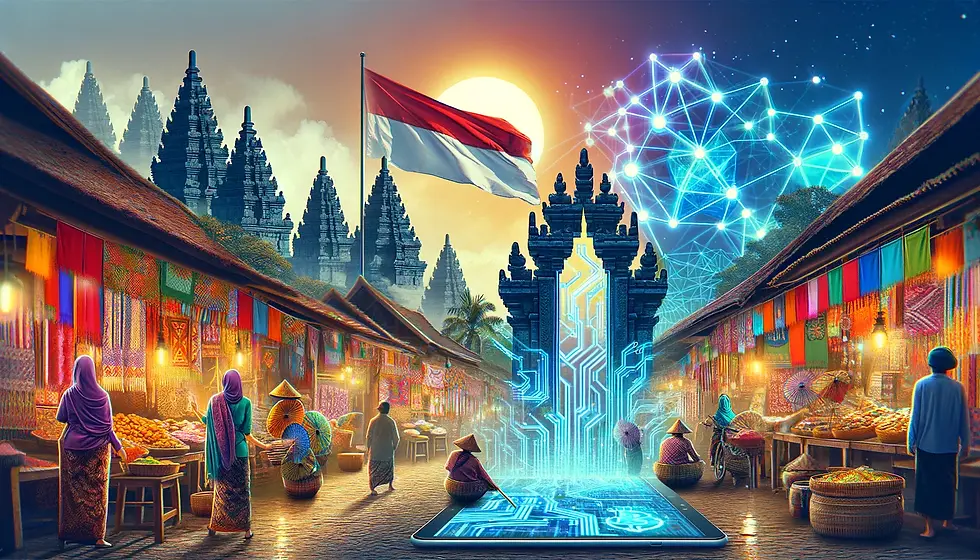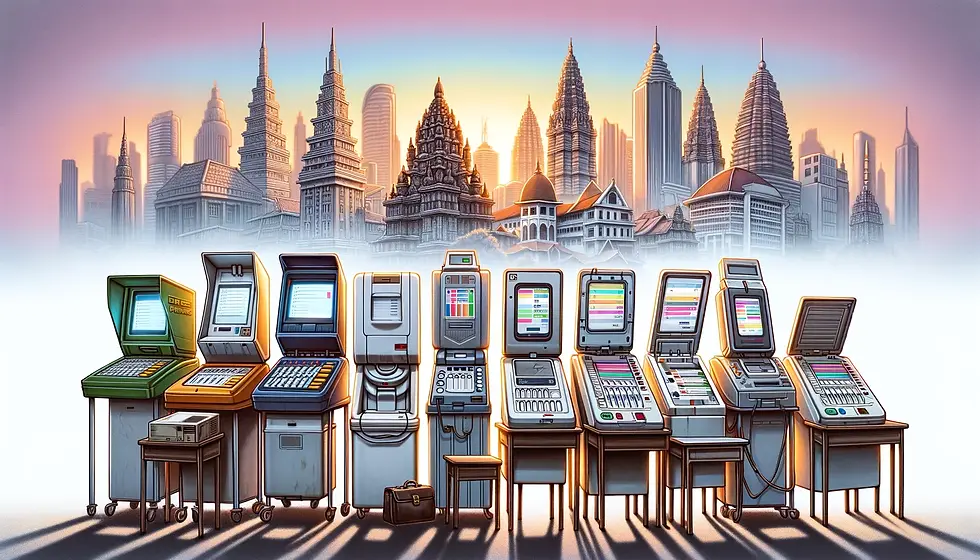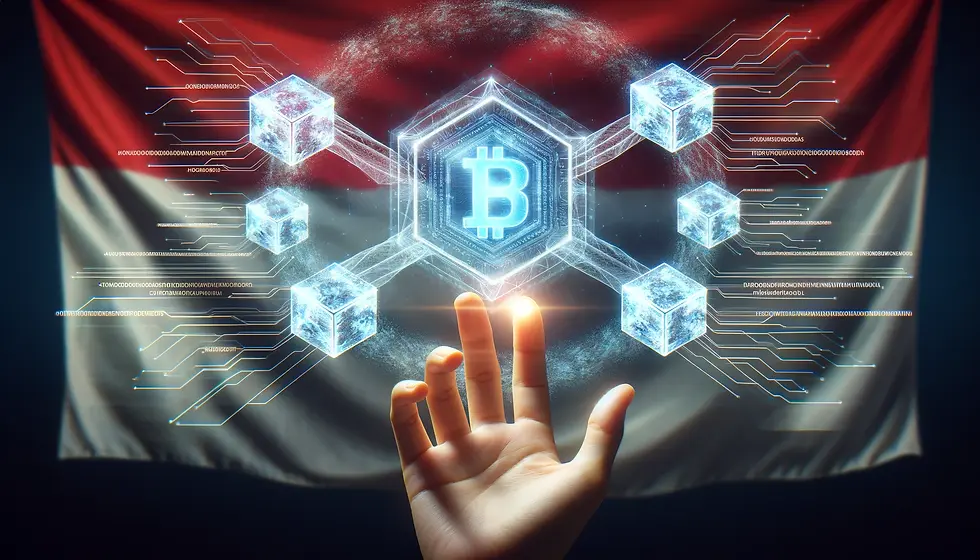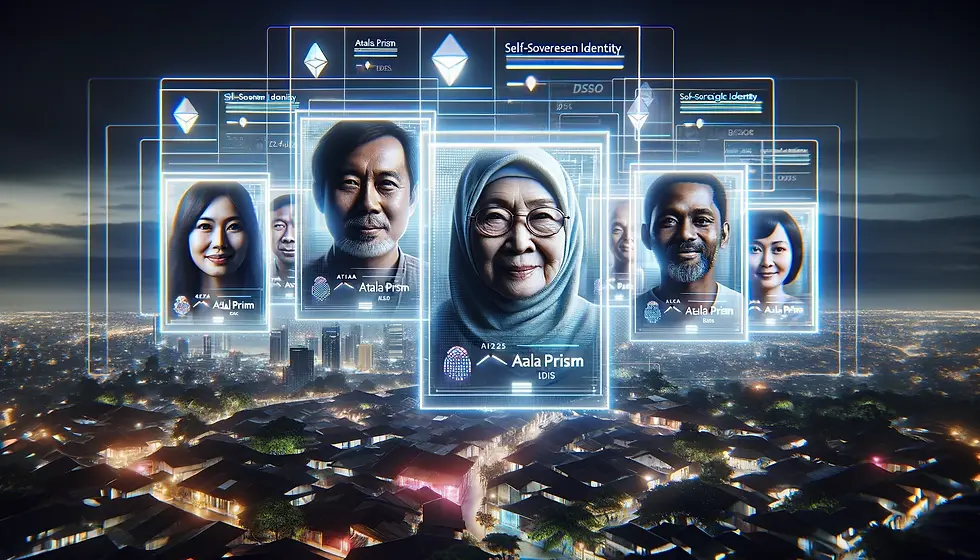Blockchain and the Future of Voting: Transforming Indonesia's Elections
- Cardanesia

- Jan 19, 2024
- 10 min read
Updated: Jan 23, 2025

In the archipelago nation of Indonesia, the ripples of democracy are set to expand across its vast expanse as the country gears up for its 2024 presidential and legislative elections. Known as the world's third-largest democracy, Indonesia's electoral journey is not just a testament to its political maturity but also a beacon of democratic values in Southeast Asia. However, the journey is not without its challenges. Issues of electoral integrity, transparency, and fairness have been persistent thorns in the side of this vibrant democracy.
As technology intertwines increasingly with every facet of life, the question arises: Could the future of fair and open elections lie in the digital realm? Enter blockchain technology, a revolutionary concept that's redefining trust and security in digital transactions. At the heart of this exploration is Atala PRISM, a Decentralized Identity (DID) solution that promises to infuse the electoral process with unprecedented levels of transparency and integrity.

This exploration is not just about adopting new technology; it's about reimagining the very fabric of democratic participation in Indonesia. It's about ensuring that every vote is not just counted, but also trusted and verifiable. As we embark on this journey through the intricacies of the Indonesian electoral process and the transformative potential of blockchain and Atala PRISM, we delve into a narrative that's about more than just an election; it's about the future of democracy in the digital age.
Understanding the 2024 Indonesian Elections
Indonesia, a nation that prides itself on its democratic ethos, is on the cusp of another significant milestone – the 2024 general elections. Set against the backdrop of its lush islands, this electoral saga is not just about choosing leaders but shaping the future of the nation. It's a complex tapestry woven with the aspirations of over 204 million voters, each looking to cast their ballot in a bid to dictate the direction of their country.
The Electoral Process: A Symphony of Democracy
The 2024 Indonesian elections are a multifaceted exercise in democracy, involving the presidential election, the People's Consultative Assembly (MPR) – encompassing the House of Representatives (DPR) and the Regional Representative Council (DPD) – and local legislative bodies. The voting process is a unique blend of tradition and modernity, where voters mark their choice using a nail to punch a hole in the ballot paper. This physical act of voting is a profound moment of democratic expression, a point where personal choice meets national destiny.

The Presidential Threshold: A High-Stakes Game
The presidential race is a high-stakes game with stringent requirements. A candidate must secure formal endorsement from a political party or coalition, commanding either 20 percent of DPR seats or 25 percent of the popular vote from the previous election. This threshold sets a high bar, ensuring only serious contenders step onto the presidential battleground. The incumbent, President Joko Widodo, having served two terms, is constitutionally barred from seeking re-election, paving the way for fresh faces to vie for the nation's top job.
Legislative Labyrinth: A Test of Representation
The legislative arena is no less competitive. With a 4% parliamentary threshold, parties vie for 580 DPR seats across 84 electoral districts. The process is a test of strategy and public appeal, with the Sainte-Laguë method ensuring a proportional representation. This intricate dance of democracy is not just about winning seats but about mirroring the diverse tapestry of Indonesian society.
The Candidates: A Mosaic of Aspirations
The presidential race sees figures like Prabowo Subianto, a stalwart making his third bid for the presidency, Ganjar Pranowo, a leader resonating with the grassroots, and Anies Baswedan, a candidate known for his moderate stance in a nation rich with diversity. Each brings a unique narrative, a different vision for Indonesia, making the 2024 elections a mosaic of aspirations.
The Challenges: Ensuring Integrity and Transparency
Despite the vibrancy of the electoral process, shadows of doubt linger over the fairness and transparency of the elections. Concerns about electoral integrity, influenced by internal dynamics and external perceptions, pose significant challenges. The sanctity of each vote, the credibility of the electoral process, and the trust of the people in the system are paramount.
It's in this context that the potential integration of blockchain technology, and specifically Atala PRISM, is seen not just as an innovation but as a necessity to safeguard the democratic process.
The Role of Technology in Elections
The intersection of technology and elections is not a new phenomenon. Over the years, various technological advancements have been harnessed to enhance electoral processes worldwide. This journey, marked by innovation and adaptation, reflects the evolving landscape of democratic practices in the digital age.
The Evolution of Electoral Technology
From the early days of mechanical lever machines to the more recent use of electronic voting systems, technology has continually reshaped the way votes are cast and counted. Each leap forward was aimed at improving accuracy, speeding up the counting process, and ensuring greater accessibility for voters. However, these advancements also brought new challenges, particularly concerning security, reliability, and trust in the system.

Global Perspectives: Successes and Lessons
Globally, the integration of technology in elections has been a mixed bag of successes and lessons. Some nations have embraced electronic voting to streamline processes and increase participation, while others remain cautious, upholding traditional methods to preserve the sanctity of the vote.
The key takeaway is that technology, when applied thoughtfully and securely, has the potential to enhance democratic engagement but requires rigorous safeguards to protect against manipulation and ensure transparency.
The Advent of Blockchain: A Paradigm Shift
Blockchain technology, a paradigm shift in how data can be managed, verified, and protected. Originally conceived to underpin cryptocurrencies like Bitcoin, blockchain's potential extends far beyond the financial sector. Its core attributes – decentralization, immutability, and transparency – make it an intriguing proposition for election management.
Blockchain Technology: Basics and Benefits
Blockchain technology presents a novel approach to data management and security, one that could redefine the trust architecture within the electoral context.

Understanding Blockchain: The Basics
At its core, a blockchain is a distributed ledger of transactions or records, called blocks, which are linked together and secured using cryptography. Each block contains a cryptographic hash of the previous block, a timestamp, and transaction data. This chain of blocks is distributed across a network of computers, making it highly resistant to modification.
The Immutable Ledger: A Foundation of Trust
The most compelling attribute of blockchain is its immutability. Once recorded, the data in any given block cannot be altered retroactively without altering all subsequent blocks, which requires network consensus. This inherent characteristic offers a foundational layer of trust, making blockchain an appealing solution for applications like elections, where the integrity of each record (or vote) is paramount.
Transparency and Security: Restoring Faith in Elections
Blockchain's decentralized nature ensures that no single entity has control over the entire database, vastly reducing the risk of centralized corruption or system failure. Additionally, the transparency of the blockchain allows all participants to verify the records independently, fostering a trustless environment where trust is embedded in the system itself.

Potential in Elections: A Leap Towards Integrity
In the context of elections, blockchain can potentially revolutionize how votes are cast, counted, and recorded. From voter registration and identity verification to ballot casting and result tallying, each step could be immutably recorded on a blockchain, ensuring transparency, reducing the risk of fraud, and restoring public faith in the electoral process.
Atala PRISM: Revolutionizing Identity Verification
In the quest for a more secure and transparent electoral process, the role of identity verification stands paramount. Atala PRISM emerges as a beacon of innovation in this realm, offering a decentralized identity (DID) solution that could fundamentally transform the way identities are managed, verified, and trusted in the context of elections.

Understanding Atala PRISM: The Essence of Decentralized Identity
Atala PRISM is not just a technology; it's a paradigm shift in identity management. It empowers individuals with self-sovereign identity (SSI), allowing them to own and control their digital identities without relying on any central authority. This concept of SSI is a cornerstone in building a more secure, private, and user-centric identity ecosystem.
The Mechanics of Atala PRISM
At the heart of Atala PRISM are three core components:
Credential Issuance: This is where the journey of a digital identity begins. Trusted entities issue digital credentials to users. These credentials are cryptographically linked to the user's DID on the Cardano blockchain, ensuring their authenticity and immutability.
Identity Wallets: Users manage their DIDs and credentials through identity wallets. These wallets enable users to control which parts of their identity they share and with whom. It's a powerful tool that places the reins of privacy and consent firmly in the hands of the individual.
Verifiers: Entities that need to verify a user's identity or credentials, like electoral bodies, can do so by interfacing with the user's identity wallet. The verifiers can then validate the credentials against the blockchain, ensuring their legitimacy without ever compromising the user's privacy.

Benefits of Atala PRISM in the Electoral Context
Enhanced Privacy and Security: Atala PRISM ensures that user identities are not centralized targets for hacking. It provides a system where credentials are selectively shared, revealing only the necessary data, thereby minimizing exposure and risk.
Reduced Reliance on Traditional Authentication: By enabling users to prove key aspects of their identity through verifiable credentials, the need for traditional, often insecure, forms of identity verification is significantly reduced.
Trust and Auditability: The immutable nature of blockchain, coupled with the decentralized structure of Atala PRISM, offers a transparent and auditable system where every credential and identity can be traced and verified without fear of tampering.
Flexibility and Interoperability: Atala PRISM's adherence to open standards ensures that it can seamlessly integrate with various systems and jurisdictions, avoiding the pitfalls of siloed identity solutions.
Financial Inclusion: In a nation where a significant portion of the population might lack official IDs, Atala PRISM can offer a secure and reliable way for individuals to establish a digital identity, opening doors to financial and social services that were previously out of reach.
A Path to Fairer Elections: By integrating Atala PRISM, the electoral process can be fortified. Voter registration can be made more secure and verifiable, identity fraud can be substantially reduced, and the entire voting process can be made more transparent and auditable.
Integrating Blockchain into the Indonesian Elections
The integration of blockchain technology and Atala PRISM into Indonesian elections would not be just a technological upgrade; it's a transformative leap towards ensuring electoral integrity and transparency. This integration can address various facets of the electoral process, offering solutions that are secure, transparent, and in alignment with democratic values.

Scenario 1: Secure Voter Registration
The foundation of a fair election is a secure and accurate voter registry. Blockchain, with its immutable ledger, can provide a platform where voter registrations are recorded securely. Each registration entry can be a block in the chain, linked to a unique DID provided through Atala PRISM. This setup not only ensures that each registered voter is unique but also allows for easy verification of voter eligibility without compromising the individual's privacy.
Scenario 2: Immutable Vote Casting and Counting
The act of voting and the subsequent counting process are the heartbeats of an election. Integrating blockchain can ensure that each vote is cast as a transaction on the blockchain, making it immutable and traceable. Atala PRISM can play a pivotal role here by ensuring that the voter's identity is verified securely and anonymously at the time of vote casting. This setup can significantly reduce the risks of vote tampering and miscounts, bringing a new level of trust and integrity to the process.
Scenario 3: Transparent and Real-Time Result Tallying
The tallying process can often be a black box, with results trickling in slowly and opaquely. Blockchain can revolutionize this by offering a transparent and real-time tallying process. Each vote, once cast, can be recorded on the blockchain and tallied instantaneously, with the results being publicly verifiable. This transparency can greatly reduce the scope for disputes and allegations of foul play.
Addressing Potential Challenges
While the integration of blockchain and Atala PRISM offers numerous benefits, it's not without its challenges. These include:
Technological Literacy: Ensuring that the electorate is comfortable with and understands the new technology is crucial. Educational campaigns and user-friendly interfaces will be essential.
Infrastructure Readiness: The technological infrastructure must be robust enough to handle the scale of the elections and the data security requirements.
Regulatory Framework: A clear legal and regulatory framework will need to be established to govern the use of blockchain and Atala PRISM in the electoral process.
Security Concerns: While blockchain offers enhanced security, the system as a whole must be safeguarded against potential cyber threats.
Cultural Acceptance: Trust in the new system is paramount. Building this trust will require transparency, education, and a demonstrable track record of security and reliability.

Navigating the Path Forward
Embracing blockchain and Atala PRISM for the 2024 Indonesian elections or future election will be a path marked by both opportunities and challenges. A phased approach, starting with pilot projects and transparency in the process, can help in navigating this path. Collaboration between technologists, election officials, and the public will be key in crafting a solution that's not only technologically sound but also culturally resonant and democratically robust.
Conclusion
As Indonesia stands on the precipice of the 2024 elections, the nation is not just choosing its leaders; it is defining the future trajectory of its democracy. The exploration of integrating blockchain technology and Atala PRISM into this crucial democratic process is more than a technological endeavor; it's a re-imagination of the foundational principles of electoral integrity, transparency, and trust.

A New Paradigm of Electoral Integrity
The potential integration of blockchain and Atala PRISM heralds a new era where the sanctity of each vote is not just a promise but a verifiable truth. This technology offers a beacon of hope in addressing long-standing challenges of electoral fraud, voter disenfranchisement, and the opaque nature of vote tallying. By embedding trust within the very architecture of the electoral process, blockchain and Atala PRISM can help restore faith in the democratic institutions that are the bedrock of society.
The Path of Innovation and Responsibility
The journey towards integrating these technologies into Indonesia's electoral process is a path paved with innovation, foresight, and responsibility. It calls for a balanced approach that marries the potential of these technologies with the cultural, societal, and political fabric of Indonesia. Education, infrastructure readiness, robust regulatory frameworks, and a commitment to security are the stepping stones on this path.
Envisioning the Future of Democracy
As we stand at the intersection of democracy and technology, the narrative is not just about the 2024 Indonesian elections. It's about setting a precedent for the future, where technology serves not just as a tool, but as a custodian of democratic values. The integration of blockchain and Atala PRISM is a glimpse into that future—a future where democracy is not just practiced but is also protected, nurtured, and cherished in the digital age.

In a world brimming with uncertainties, the pursuit of fair and open elections remains a constant beacon of hope. Indonesia's exploration of blockchain and Atala PRISM in its electoral process will be a testament to this enduring quest—a quest that resonates with the aspirations of democracies worldwide.







Comments